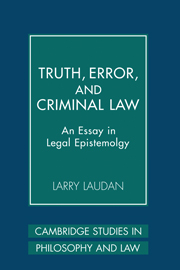Preface
Published online by Cambridge University Press: 05 June 2012
Summary
Every author owes debts more numerous than he can mention. Of some, he is barely aware, though they are no less real for that. More troubling are those that run so deeply that they cannot easily if ever be repaid, and certainly not by the bare acknowledgment of their existence. Still, it remains important to mention them, even if the gesture is brief and fleeting.
I first became interested in epistemological issues surrounding the law about five years ago, having previously devoted myself to the philosophy of science and applied epistemology. More by accident than by design, my earliest encounters with academic law occurred at the University of Texas, where I often go to consult books unavailable in Mexico, where I work. On one of my annual trips north of the border, I decided to stop into the office of Brian Leiter in the University of Texas Law School. I had, by chance, been reading a classic legal case, In re Winship, a few days before. Leiter and I did not know one another, but something was bothering me and I knew his reputation as one of the few philosophers of law with an interest in questions of proof. After introducing myself, I asked him (more or less): “I can't make sense of what the court is saying about proof beyond a reasonable doubt. Can you straighten me out?” After puzzling over the relevant passages, he replied candidly: “No.”
- Type
- Chapter
- Information
- Truth, Error, and Criminal LawAn Essay in Legal Epistemology, pp. xi - xivPublisher: Cambridge University PressPrint publication year: 2006
- 1
- Cited by

